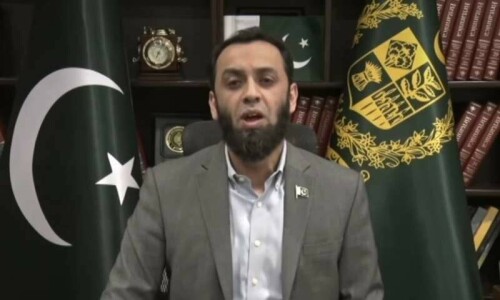UNITED NATIONS: Pakistan is set to join the UN Security Council for the eighth time on June 6, representing the Asia-Pacific group within the United Nations.
Pakistan has been elected to the Security Council seven times, tied with Colombia, with the most recent term in 2013. Additionally, Pakistan is among the countries that have had a diplomat serve as president of the United Nations General Assembly.
“Pakistan’s election to the Security Council as a non-permanent member for the term 2025-26 would provide an opportunity to promote international and regional peace and stability,” said the country’s UN Ambassador Munir Akram.
Amb Akram highlighted the profound changes in the external environment, noting new configurations in the international order marked by technology, geostrategic conflicts, competition between major powers, and climate change that were reshaping the global landscape.
Islamabad confident of joining UN Security Council for an eighth time
“As the world transitions from the unipolar world order to what I call a ‘bipolar plus’ order, countries are bound to adapt to the changing external environment,” he said.
Elaborating on Pakistan’s active participation within the UN system, Mr Akram emphasised efforts to secure the implementation of UNSC resolutions on the Jammu and Kashmir dispute. He also underscored Pakistan’s significant contributions to peacekeeping operations under the United Nations.
Pakistan has participated in 46 UN peacekeeping missions across 29 countries. As of 2023, 168 Pakistani peacekeepers lost their lives during UN missions since 1948.
During the current debate within the UN on the Palestinian dispute, Pakistan reaffirmed its unwavering solidarity with the Palestinian people and strongly condemned Israel for its actions in Gaza.
Pakistan and India are both members of the Asia-Pacific group within the UN, which has two seats in the Security Council. The group has more than 50 members who follow a rotational method for the Council’s membership. This means that even India and Pakistan vote for each other as the group’s candidate. That’s why in 2019, Pakistan backed India and this year India is expected to back Pakistan.
In accordance with the Security Council’s rotation rules, the ten non-permanent UNSC seats rotate among the various regional blocs into which UN member states traditionally divide themselves for voting and representation purposes.
The five available seats for this year are allocated as follows: One for Africa; one for the Asia-Pacific group; one for Latin America and the Caribbean; and, two for the Western European and Others Group Somalia and Mauritius are contesting for the seat allocated to the Africa Group. Pakistan is the only candidate for the Asia-Pacific group. Denmark and Greece are contesting for the two seats available for the Western Europe and others group. Panama is the candidate for the seat allocated to the Latin America and the Caribbean group.
Currently, Japan and the Republic of Korea represent the Asia-Pacific group in the Security Council. Japan completes its term on Dec 31, 2024, and the Republic of Korea will complete its term on Dec 31, 2025.
Speaking to members of the Pakistan Students Association Coalition via video link, Amb Akram said Pakistan would articulate developing countries’ aspirations, work for peace and in the Middle East and Africa as well as promote the right of self-determination for peoples under foreign occupation if elected to the USC as a non-permanent member, APP adds.
Pakistan has been elected to the Security Council seven times, with the most recent term in 2013. Other occasions were in 1952-53, 1968-69, 1976-77, 1983-84, 1993-94 and 2003-04.
Mr Akram said the election to the 15-member Council would bring a lot of responsibility to Pakistan to play a leadership role in addressing “our issues like Kashmir, Afghanistan and counterterrorism”, but also other multiple global challenges.
The Coalition comprises US-based Pakistani student associations of various colleges that are linked by their unwavering commitment to preserving the Pakistani identity, traditions and its rich culture.
The Pakistani envoy said that UNSC resolutions on Kashmir issue provided for the realisation of the right to self-determination by Kashmiris. No gimmicks by the Indian government could alter the international status of the dispute, which is on the UN Security Council agenda, he told the students.
Published in Dawn, May 20th, 2024













































